Maryan Myres Shumway uses art, music, and teaching to build community and cultivate “Zion” wherever she is. She has traveled all over the world, living most of the year in Qatar and spending summers in the United States where she and her husband run a girls ranch. Maryan is the oldest of nine children, and the mother of seven. Her youngest son has autism, and together they have “climbed the autism mountain,” learning and creating with each other. She has taken up art and the cello as part of her journey with him, now playing in the Doha Community Orchestra and teaching art to children and adults with disabilities. As a young missionary, Maryan served a welfare mission in Kaohsiung, Taiwan, and then was called to Thailand and the Philippines to work in refugee camps under the auspices of the United Nations. There she learned how to connect with people of all backgrounds, and how to offer love and comfort in the wake of tragedy. She writes a blog called Opening the Sky that seeks to foster cultural understanding. Recently she started a foundation called Art4Every1, and believes in the power of creativity and art in uniting those of different backgrounds, beliefs, and experiences.
You’ve lived all over the world, raising your family all over the United States and China and the Middle East. What has helped you find and create home wherever you are?
A while ago I decided I have pockets of home everywhere—sometimes, I would say, the pocket is bulging! Patricia McLaughlin, the children’s author of Sarah, Plain, and Tall expresses it best for me: “There is always something to miss, no matter where you are.”
Do you find that is the case for you? That you miss a lot of places?
Oh, yes. There are places and people I miss around this world—especially my family. But I’ve learned that home can be picked up and carried somewhere else. I currently live a dual life: a very full summer life in the United States, and the rest of the year an international life filled with travel to many diverse places. One summer I counted I had slept in 20 beds! Perhaps that sounds exotic to some, but because I’m a nester, I have to reconcile the dual lives sometimes. However, from the start I have felt at home in Qatar, my home in the Middle East.
What are some of the things that make up your summer life and international life?
My husband and I direct a ranch in the Tetons for teenage girls and I teach art to teenage boys. The ranches and the principles we teach are very important to me. This year we are entering our fifth year of living in the Middle East. Every year is different when you’re an expat because the ward, school, and compound (neighborhood) are different than the year before. People move; it’s very transient. It has made me understand the importance of how transitory our interactions are with others. We never know how long they will be on our “island.” Each year is singularly a new adventure to be discovered and treasured.
What has helped you with the transience and duality of your life?
Last year when I came back to Doha for the fourth school year, I was feeling a little tired with the ever-constant change, and I asked my husband for a blessing. In the blessing, it said, “The Lord has given you the gift of adaptability.” And I just looked up and said, “Okay. I will remember I have that gift.” Most of the time I feel adaptable, and I do love traveling. But, at times I miss the familiar—home and family—and then I remember I have pockets of home all over the world.
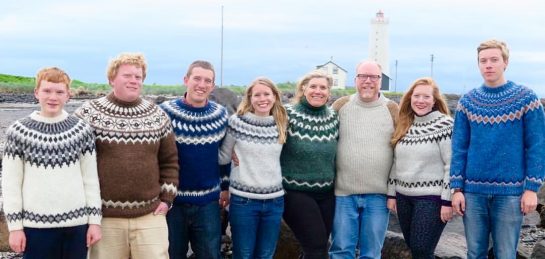
Maryan with her family in Iceland, where she has family roots.
Do you have any experiences you can think of that helped remind you of these pockets of home?
We went back to St. Louis recently for the wedding of my son’s best friend. He is like an adopted son to us, and we love him very much. We raised our kids in St. Louis for many years, but I had forgotten some of the beauty and ties we built there. When I returned, I began to remember all the people and the Zion of that former chapter who tutored me. Going back was a beautiful experience.
I think when you go into a new chapter of life, you can’t turn back too often—and I haven’t, and it’s a good thing because I needed to leap so far across the world into so many different places—but periodically it’s important to return to the sources of our love. Friendships are important to me; we help each other learn and grow up. These relationships are not only with our family or members of the church, but neighbors, and in the community.
Are there any other things that help you create home?
I think it is important to create a unity of community. I play the cello in the Doha Community Orchestra. I am an adult learner of the cello. It has been a fabulous journey but it requires much patience. It is my nature to automatically want to play a Bach cello suite. It’s interesting because my son Elias, who has autism, is the one I give credit for me learning the cello. He wanted to play the cello since he loved listening to The Messiah, and many orchestral pieces. Another son, Hyrum, plays the cello, but I certainly never aspired to be a cellist. Yet, Elias wanted desperately to take lessons. We found a cello teacher and a cello, but it didn’t work out for him. I knew it would be hard for him to learn, and it was, but I ended up loving the sonorous, soothing sound. It was December and I was playing Christmas songs, and I thought, “I love this. Why haven’t I ever done this until now?” Tears were dropping on my elbow. My supportive husband said, “Keep it up! Keep going. You can do it!”
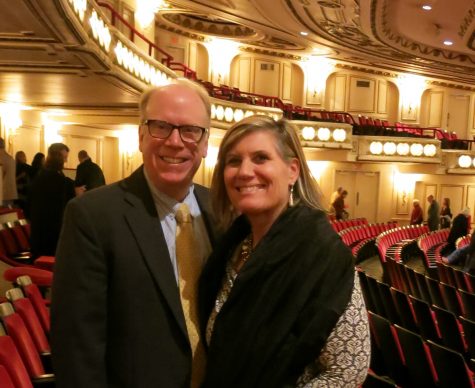
Maryan and her husband Joseph at a Yo Yo Ma concert, soon after she began studying the cello.
So, I kept playing. I had goals and I had a wonderful teacher. But I had never been in an orchestra until coming to Qatar. I play the piano and guitar, but I had never played a string instrument. When we got to Doha, I auditioned for the community orchestra. We have six cellists—from France, Chile, Australia, Britain, Yemen, and then me. My stand partner when I started was a 14-year-old French girl from Normandy. We were great friends. I am now starting my fifth year in the Doha Community Orchestra.
Oh, that’s beautiful. And they all support you in your musical goals?
I have felt so much support, honestly. Once, I said to the Australian cellist when I started, “I’m sorry, I don’t understand this stanza.” And he kindly, reassuringly said, “There’s room for everybody on this bus”—after answering my question. I appreciate them letting me on this musical bus in Doha! The “musical bus” analogy is important to me because I believe when we have a community or Zion we must allow everyone to feel like they belong and can contribute. Although many of the musicians in the orchestra are music majors or have gone to music school, they are inclusive and let everyone climb aboard. I have an unexpected musical community in Doha.
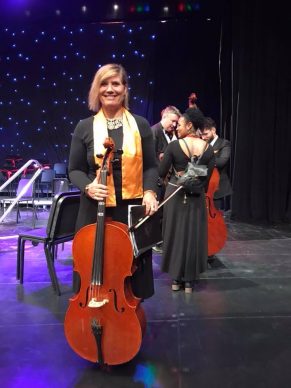
Playing at the Christmas concert with the Doha Community Orchestra
That is wonderful. What other communities have you created while in Doha?
I started a tradition in our ward of a monthly musical soirée or gathering at my home. The idea came from my German cello teacher. She would bring in these fabulous professionals from Germany and Vienna to perform for us when they were visiting Qatar. We have kids and families in the ward who come, sometimes their friends. It’s like a big family home evening. People sometimes practice all month for the soirée, so that’s been wonderful to see people’s talents grow—teenagers and children too.
I also think it’s vital to find things to connect you to a larger community. For example, this year I am starting a Mother’s Retreat for moms here.
I know you’ve done a lot of work for children with disabilities in Qatar. Could you tell me more about that?
Elias and I teach art in a school to kids with disabilities, and that’s been truly remarkable. I feel the Spirit so much when I go, like the Savior is there in the room saying, “Thank you for taking care of these kids, whom I love.” I also connect with the children’s parents and try to give them encouragement. I know the autism journey can sometimes feel lonely, and I want them to know others recognize and notice their child’s progress.
I feel like I’ve received hope from so many people. It’s a wonderful way for me to try and give back. These kids are from Tunisia, Egypt, India, Qatar, Lebanon, and Scotland and many can’t speak. But it’s amazing to see what art does for them. It opens them in unique ways. I have started a foundation called #Art4Every1 to promote art for those who have a faint voice.
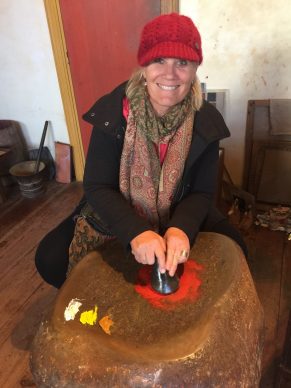
Maryan learning how to make paint at Rembrandt’s house in Amsterdam
In your blogs, you have written very beautifully about “climbing your autism mountain.” What have been some of the challenges and experiences for growth as you, Elias, and your family have “climbed your autism mountain” together?
Since Elias is our youngest child, it has been a rich journey to learn more about compassion and service within the walls of a family. I often say, “I would not trade the autism experience for our family.” For Elias, of course, I would want him to have a more typical life. But I know from his recent patriarchal blessing that he chose this role and experience in mortality. Obviously, he is here to teach and shape us. I hope someday when the Savior heals us all, Elias will be pleased with what we have learned as a family.
As for the challenges, one is the feeling of not knowing—not knowing what to do, not knowing how to proceed. I am a planner, and I have had to learn how to live with more faith in the Great Unknown. I’ve been very grateful for the people who have supported me and put their arms around me a few times. It is particularly hard at the beginning of a child’s diagnosis. I remember perceiving he might not be on a typical child’s developmental chart. I felt fear and a sense of loss. I loved reading to my kids, and I grieved because Elias didn’t want to sit and cuddle with me and listen to books for hours like my other children. I thought, “What are we going to enjoy together? And so, people have come in my path—in unexpected places and times—to help us.
Tell me more about that.
I have serendipitously met people who have been on our path to help. I can think of three people in particular, but there have been many more. When we first moved to Doha, Elias’s art teacher noticed he was having problems. He was calling out and making noise and having trouble with the different routines of living in another country. So he volunteered to work with him an hour a week after school. For the next two years, he met with Elias after school every week. That teacher changed our lives. He was able to get him into an art exhibit, and that promoted Elias’s confidence in himself as an artist. Elias said he began to think of himself more as an artist and as a creator.
There’s also a Qatari man, who is director and curator of a big art museum here. One time we went to his huge artist loft next to the museum—it is kind of the Soho or Greenwich Village of Doha. He immediately saw that Elias had autism, and just said, “Let’s go do an art project!” And now he’s brought him into two exhibits and wants Elias to do a big solo exhibit in Doha this year.
Back in the States, another friend built an art barn studio at one of the Teton ranches where we teach. Elias feels a sense of place there—a purpose and meaning to create. He feels included and that he belongs there.
There are so many wonderful experiences Elias has brought to me. Art transcends disability and differences. You don’t need words, but it’s just been this wonderful, improvisational journey. I remember feeling very sad a few times, and not knowing how the future would turn out. I didn’t know any other child with autism. But I knew I had to start climbing the autism mountain. I never could have imagined the views along the way.
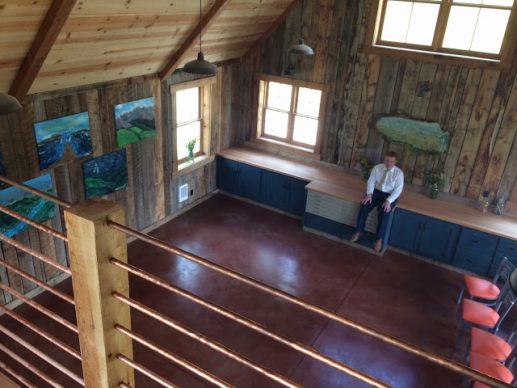
Elias in the “art barn” in the Tetons
Did you do art before Elias? Or is this also something you’ve learned with him?
It’s something I have mostly learned alongside him. I have enjoyed a few art classes and spent countless hours in art museums. I love painting and doing art, but I was not an art major, for sure! I have a master’s degree in International Relations. But Elias and I discover art together. We watch youtubes, talk to artists, buy different tools. We take a class from an artist here in Doha. This morning we experimented with linoleum printmaking. We talk back and forth, try new projects, experiment together. When I reflect and look back, it’s funny, truly astonishing, to see the path my life has taken.
Tell me a little more about this camp that you run in the summer.
My husband and I direct a girls’ ranch in the Tetons. It is a place where creativity and a love of nature, God, and people grow. Teenage girls are given this gift to work together, away from the distractions of the world. Their confidence in themselves and their faith in God heightens. They then go out to make a difference in the world—after feeling a sense of Zion. I think the Lord wants us to take the time to reflect, change, pause, and thus, grow. One of my favorite experiences is to see their countenances shine brighter and brighter as each day passes.
This past summer Elias and I taught art at the boys’ ranch to many boys who were athletic, strapping, basketball-loving teenagers who had never held a paintbrush since kindergarten. It’s incredible to see the way doing art with nature shapes them. They bring their scriptures and then I tell them to pick a theme—mountains, water, trees, wind, light, etc. We can see the Tetons from the art barn, which is heavenly. They open their scriptures and look at the Topical Guide and they read everything about whatever their theme is, and then they—a team of five boys and a mentor—collaboratively paint an exquisite painting.
It is tremendously powerful seeing the boys in their scriptures, trying to figure out how to paint light, or the sky, or a tree. This summer one group’s theme was a storm so they painted a picture of when Jesus’ boat was in a storm on the Sea of Galilee. They painted the ship, and then I gave them some plastic wrap, which they put some paint on to make it look like frothy waves around the ship. It looked incredible, and they knew it, and were so pleased. The five boys were so excited and loudly exclaiming, “Wow!” Not only did their creativity unfold, but so did their love of the scriptures. These stories become more real and alive to them. That’s what art can do.
I think kids today have a lot of screen time, competition, and anxiety about the future. They wonder, “Can I be enough?” They need more time to step back, hear quietness, and feel peace flow into their hearts. Spending time with a paint brush can be very revealing time for them. They discover their testimonies and their love of the gospel in a different way, through art. They are happy and proud of their creations. As I work with them and they read the scriptures and understand the image they want to create, an undeniable peacefulness comes into the room. They feel and recognize it. We are all touched, and sometimes I just cry because I feel so much love for these teenage boys, the nature around us, and the spirit who is our companion together. We share and talk, and sometimes there is just a comfortable quiet.
I’m interested in hearing about your experiences abroad, especially about international womanhood. Are there any experiences you can think of where you’ve felt connections which bridge cultures and women from different backgrounds?
I am very passionate about international womanhood. I love the fact that Relief Society is a worldwide sisterhood. We certainly see that in our Relief Society in Qatar. I think one of the greatest things about being in Doha is that we have about 20 different countries represented in our ward. We have an African Relief Society president, a Ukrainian primary president, many members from India, people from all over the world—Pakistan, Nepal, Sri Lanka, and more. It’s just a mosaic of people. I wish every single member of the Church could see, or even go to Church one week with us. Every week we experience a glimpse of Zion—a front row seat to what I feel the Lord wants. We are all working together; we are all truly one—not perfect, but nonetheless, trying. I am completely humbled to see how others mirror the gospel, to see their living expression of consecration. It has made me want to be a better person and be more like them.
I have also experienced friendships with people from different cultures which have been incredibly important to me. One of these friendships is with my next-door neighbor Abeer, who is Muslim. She wears a burqa and is very religious. The first time I ever met her, I looked at her big, beautiful green eyes and she said to me in very plain English, “Please don’t make boundaries with me.” She continued, “I want to be your friend. I will learn you to drive here. I’ll learn you to make Arabic food and spices.” She calls me her sister. There are just so many ways women can support one another. I learn again in every chapter in my life the importance of unity and community, especially among women.
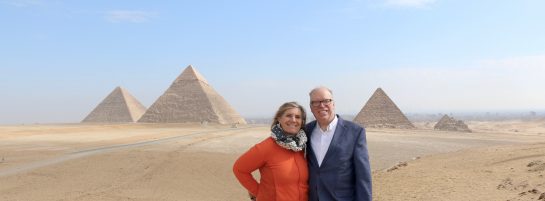
Maryan and her husband Joseph, in Egypt
Did any earlier experiences prepare you for creating friendships with people of all backgrounds?
One of my favorite stories to share is from my mission. I was able to work through the auspices of the United Nations with refugees on my mission.
I was originally called to Taiwan. I absolutely loved serving in Taiwan. But Elder Marion D. Hanks, who was the general authority over the Asian area, had an idea to serve others with “no strings attached” (that is what he always called it). He wanted to experiment serving in another way—by not having a proselytizing endeavor, but just teaching the Laotian, Vietnamese, Cambodian, and Hmong refugees in Thailand and the Philippines. I was in Taiwan as a welfare missionary and then was suddenly called to Thailand after being there for seven months. I would teach a thousand Cambodians or Vietnamese at a time in a big roofed pavilion. We would teach them English and other lessons about living in their country who would be sponsoring them. I spent the last three months of my mission in the Philippines, developing a literacy program there to teach older refugees.
So you served in three different countries on your mission?
Yes. It was hard to leave Taiwan. I was blissfully happy there with my Chinese companion. But going to serve refugees was a marvelous reawakening for me too. Elder Hanks always taught the importance of pure religion. Through that kind of service, I have learned that when we serve with pure motives and love without boundaries, other people’s heads turn. They are not suspicious anymore of our actions. Instead, they just see our love.
One day I was teaching some Cambodian women, who were all in their sixties and seventies. There were about twenty of them in the room, and I was trying to teach them the phrase “I like,” and then after that word, I put “I like bananas” on the chalkboard. The next day, the women brought me their food rations of bananas. There was a huge pile of bananas on my table in the classroom. We all laughed, but I also felt sheepish taking their food rations. Some brought me three, another brought ten, some brought 15. They were just looking at each other, measuring and comparing, what each other had brought. So, the next day (to solve my problem of having too many bananas), I made banana bread for them. But as we sat there that day, for some reason, whatever I mentioned made them remember the pain of their past in Cambodia. They had all witnessed a genocide with their own eyes—many of their families were killed. All of them started crying—like dominos falling one by one. I didn’t speak Cambodian, so I asked my translator what they were saying, and he sadly told me.
I had heard their stories many times before, about how their children had been killed before their eyes. But this time as I heard them, I just felt the Lord’s spirit so strongly. All I can say was He was there that day as they cried on their straw mats on a cement floor in the Philippines. It was a holy temple/classroom where I felt the Lord’s immense light. Although these women were Buddhist, it didn’t matter. I was just 22 years old and I didn’t have a lot to give. I hadn’t even graduated from college—so I just listened and hugged them.
As I came out of that classroom, I walked home feeling very heavy and helpless. How could I help them with all their sorrow? When I returned home, I was looking in my scriptures and I immediately found a scripture that really touched me. It’s in D&C 101: 16: “Therefore, let your hearts be comforted concerning Zion, for all flesh is in my hands. Be still and know that I am God.” From then on, I knew that no matter what inequality I saw, it all would be compensated for and that Zion would eventually come.
I continued to see many inequalities and hear much sorrow. For example, 90% of the Vietnamese women were raped. I talked to them about their losses and the family members who were missing or who had died. After our classes, we ministered to them as we went around the refugee camp every day. For me, my mission was the beginning of my love and desire to create Zion wherever I am. It was interesting that 20+ years later my own son was called to the Melbourne, Australia Mission to teach in the Vietnamese language. He taught many refugees, which filled my heart with great joy.
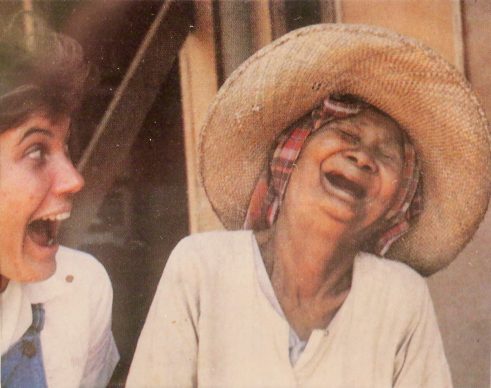
Maryan with her “Cambodian grandma,” Jidon.
Do you feel like your experiences on your mission prepared you for your life today?
Yes, definitely. It’s interesting how all these years later, that experience of working with people of very different cultures and backgrounds prepared me for this experience in Qatar. I can’t talk about the Church. But I can love, and I can teach tennis and art. I can have the Savior in our art room because I know He’s there.
What else has helped you create Zion wherever you go?
I think remembering that we are all children of God. There’s another scripture I want to share. It’s in Leviticus 19:33-34, and I love it because it’s a Muslim, Jewish, and Christian scripture. We all subscribe to this belief about the stranger. It’s one of my favorites: “And if a stranger sojourn with thee in your land, ye shall not vex him. But the stranger that dwelleth with you shall be unto you as one born among you, and thou shalt love him as thyself; for ye were strangers in the land of Egypt: I am the Lord your God.” I think that being in Doha for me has felt like that. It looks like a wilderness, and it is—with every hue of taupe and tan you can imagine. But I’ve felt so much living water here. I have been treated like a sister, not as a stranger. As it says in the scripture, I have felt “as one born among you.” That’s the way I have felt among the Muslim people here in this region. I have been called many, many times their sister. One friend from Oman calls me her “twin sister” since we both have children with autism. I fast with them. There is just this great love and unity. Love is transcendent; it doesn’t matter what our beliefs are. We are all children of God.
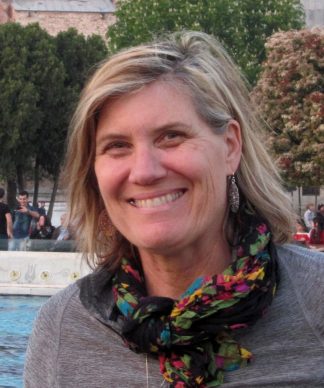
Maryan in Turkey.
That is beautiful. Is there anything else you want to share?
We can serve every day in small and simple ways. I think the magnanimous, big humanitarian projects are important and needed, but the most important resource and message we give is who we are. I recently heard that bringing about Zion can be accomplished sometimes by just listening to someone.
I think the Lord will reveal to each us what we can do in our own circumstances. This can be with your children and your family—even young children. You don’t have to go too far away. In my own life, as a young mother, I brought my kids to homeless shelters and we adopted grandmothers at a rest home. I wanted my kids to feel the spark of service. We can all figure out ways to minister to our neighbors, whether across the world or across the street. I know it’s simplistic, but it’s very true. I know He is depending on us to succor and love His children.
My own family circle, particularly my husband and children, have given me the richest gifts as we have served and loved one another. Sometimes when I meet young mothers, they express they are not enough or not doing enough. But they are. I want to tell them all the stretching, reaching, and loving is worth it. The daily interludes of learning how to love in a family have been the most beautiful and meaningful parts of my life. One of my favorite quotes is from Where the Wild Things Are, “And Max the king of all wild things was lonely and wanted to be where someone loved him best of all.” I think in our core that is what we all want.
Relationships are sacred and eternal—in families and with others around us. I remember my father’s earnest, pleading voice as he gave a family prayer long ago. As we all squirmed on our knees (all nine kids), he asked the Lord to tear down the Iron Wall and Bamboo Curtain. I remember his voice quivering as he prayed that night for us to love others and have the gospel permeate every land. I have never forgotten it. My parents were strong examples of inviting others in and building Zion. I believe that as circumstances allow, our homes can be a home or second home to others. There are so many people who don’t have a refuge or home, a parent or parents, a sister or brother—or if they do, they have only known fractured relationships. The responsibility of building homes, whether it is one home or a bulging pocket of homes, is what will ultimately build Zion—to be of “one heart and one mind.”
At A Glance
Name: Maryan Myres Shumway
Location: Doha, Qatar
Marital History: Married
Children: Seven children, one deceased
Occupation: Teacher, writer
Education: B.A. in English from Brigham Young University, an M.A. in International Relations from New York University
Languages Spoken at Home: English, but I try to keep my Mandarin up and work on Spanish, French, and Arabic. I am inspired by President Nelson!
Favorite Hymn: If You Could Hie to Kolob
Website: www.openingthesky.com, and @openingthesky, and #Art4Every1, and @Shumway and Designs
Interview Produced by Megan Armknecht
